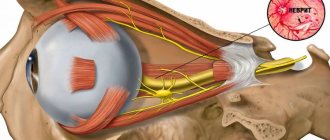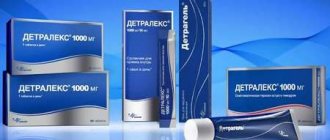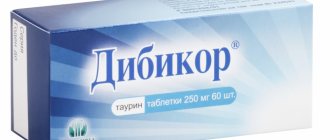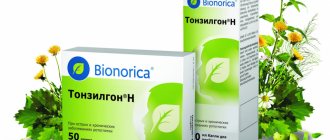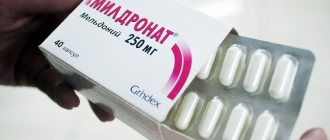Erispirus instructions for use
Release form Long-acting tablets Packaging 15 pcs. - blisters (2) - cardboard packs.
Pharmacological action A drug with bronchodilator and anti-inflammatory effects. Reduces the manifestations of bronchospasm and inflammation in the respiratory tract. The mechanism of action is associated with antagonistic activity towards histamine H1 receptors and myotropic antispasmodic activity. Reduces the production of a number of biologically active substances involved in the development of inflammation and contributing to increased bronchial tone (including cytokines, TNFα, arachidonic acid derivatives, free radicals).
Pharmacokinetics Well absorbed from the gastrointestinal tract. Cmax is reached 6 hours after administration and decreases by 3 times after 12 hours. It is excreted mainly by the kidneys (90%), through the intestines – 10%. T1/2 - 12 hours.
Indications: Rhinopharyngitis, laryngitis, otitis media, sinusitis, rhinotracheobronchitis, bronchitis, maintenance therapy for isolated and complicated bronchial asthma, respiratory symptoms due to measles, whooping cough, and influenza.
Contraindications Hypersensitivity. Hypersensitivity to fenspiride, pregnancy, lactation, children under 14 years of age (for tablets) Fenspiride is contraindicated for use during pregnancy and lactation (breastfeeding).
Use during pregnancy and breastfeeding Fenspiride is contraindicated for use during pregnancy and lactation (breastfeeding).
Special instructions Treatment with fenspiride does not replace antibacterial therapy and cannot serve as a reason for postponing adequate prescription of antibacterial drugs.
Composition: 1 tablet: fenspiride hydrochloride 80 mg. Excipients: colloidal silicon dioxide anhydrous - 0.5 mg, magnesium stearate - 2.2 mg, hypromellose K100M - 10 mg, povidone K30 - 12.8 mg, hypromellose (HPMC 5) E15 - 30 mg, hypromellose K15M - 60 mg, calcium hydrogen phosphate dihydrate - 104.5 mg. Shell composition: macrogol 6000 - 0.3 mg, glycerol (glycerol) - 0.3 mg, magnesium stearate - 0.3 mg, titanium dioxide - 0.8 mg, hypromellose E5 - 4.4 mg.
Directions for use and dosage: Take orally before meals. Adults - 80 mg 2-3 times a day; children - 4 mg/kg/day.
Side effects From the gastrointestinal tract: nausea, dyspepsia, stomach pain, vomiting. From the side of the central nervous system: drowsiness, agitation. From the cardiovascular system: rarely - tachycardia. Allergic reactions: very rarely - erythema, angioedema, fixed erythema pigmentosa, rash, urticaria (due to the presence of parahydroxybenzoate in the syrup). Possible: moderately severe dyspeptic symptoms, nausea, epigastric pain, drowsiness. Rarely: moderate tachycardia.
Drug interactions Concomitant use with alcohol and sedatives is not recommended.
Overdose In case of overdose of the drug, you should immediately seek medical help. Symptoms: drowsiness or agitation, nausea, vomiting, sinus tachycardia. Treatment: symptomatic therapy, gastric lavage, ECG monitoring. Maintaining important body functions.
Storage conditions Keep out of the reach of children. Store at room temperature 15-25 degrees.
Roszdravnadzor recalls the drug “Erispirus” from circulation
Roszdravnadzor intends to withdraw from circulation the drug Erispirus, which contains the substance fenspiride. This is reported on the website
departments.
"Erispirus" is an anti-inflammatory bronchodilator drug. It is recommended for asthma and upper respiratory tract infections. Its active ingredient is fenspiride, previously recognized as dangerous for the heart.
“The Federal Service for Surveillance in Healthcare brings to the attention of subjects of medicines circulation a letter from Sandoz CJSC about the revocation of registration certificates and the withdrawal from circulation of all series of medicines “Erispirus (INN: Fenspiride), extended-release film-coated tablets, 80 mg " and "Erispirus (INN: Fenspiride), syrup 2 mg/ml," the department said in a letter.
“Taking into account the potential risk for patients due to prolongation of QT intervals on the electrocardiogram, after the publication of this information regarding the drugs “Erespal, film-coated tablets 80 MP” and “Erespal, syrup 2 MP” (INN - Fenspiride), the Company conducted internal assessment of the situation and medical assessment of the risks for the Company's drugs listed above. During the medical risk assessment, it was found that no adverse events associated with prolongation of the QT interval were recorded when taking the Company’s drugs,” noted representatives of Sandoz CJSC.
However, as a precautionary measure, the company has initiated a voluntary withdrawal of marketing authorizations for Erispirus tablets and syrup.
Company representatives recommend that healthcare professionals stop prescribing and dispensing the drug to patients and inform those about alternative therapy.
Erispirus has become the third cough medicine to be recalled from the Russian market over the past month. Previously, it was reported that the drugs Erespal and Epistat containing fenspiride were recalled, as they may affect heart health.
The withdrawal of the French drug Erespal from circulation, which raised questions among the French authorities, became known on February 14. “The Federal Service for Surveillance in Healthcare brings to the attention of subjects of medicines circulation a letter from the representative office of Servier Laboratories JSC, France, about the revocation of registration certificates and the withdrawal from circulation of all series of Erespal medicines... due to the unfavorable benefit-risk ratio “when using these drugs,” said the Roszdravnadzor document. At the same time, the territorial bodies of Roszdravnadzor need to ensure control over the withdrawal from circulation of all series of these drugs - we are talking about film-coated tablets and 2 mg/ml syrup.
Previously, the French regulatory authorities decided to withdraw from circulation drugs containing fenspiride.
This became known from a message from the Russian representative office of the pharmaceutical company (Servier), the owner of the registration certificate for Erespal (called Pneumorel in Europe).
Later, the Hungarian pharmaceutical company Gedeon Richter Ltd, against the backdrop of the situation with Erespal, decided to withdraw from circulation and no longer supply the analogue of this medicine, Epistat, to the country. “Taking into account these data and taking into account the fact that Erespal is prescribed for the treatment of respiratory tract diseases (rhinopharyngitis, laryngitis, tracheobronchitis, bronchitis (with or without chronic respiratory failure), bronchial asthma (as part of complex therapy), respiratory phenomena (cough, hoarseness, sore throat) with measles, whooping cough and influenza, with infectious diseases of the respiratory tract accompanied by cough, when standard antibiotic therapy is indicated), otitis and sinusitis of various etiologies, for which there are alternative methods of therapy, it was decided to withdrawal from circulation of the medicines Erespal®, 80 mg, film-coated tablets and Erespal®, 0.2%, syrup,” the message said.
Erespal, or fenspiride, is a bronchodilator drug mainly used for bronchial asthma. Also recommended for acute pharyngitis, laryngitis and other respiratory infections of the upper respiratory tract.
In Russia, Erespal is included in the list of vital and essential medicines (VED).
Research on fenspiride began in the early 1980s. Its effect on otitis, bronchitis, and pneumonia was studied. The results were successful, and by the 1990s, researchers began to study the effect of fenspiride on the bronchial muscles. It turned out that it is able to counteract the narrowing of the airways. Over time, its range of uses has expanded to cover most lung diseases.

